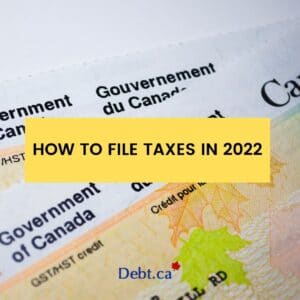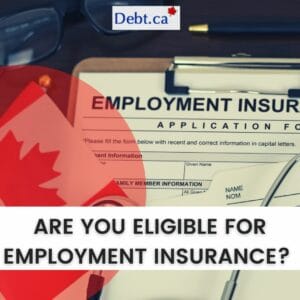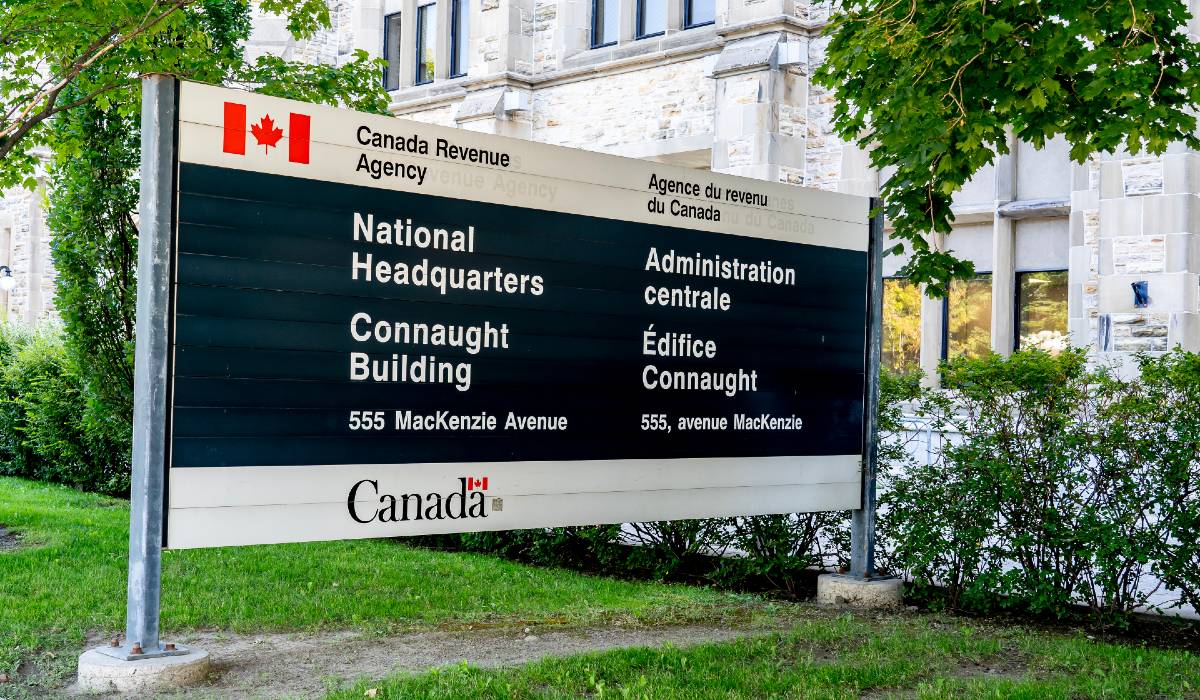Income taxes are a large financial obligation. Every individual files taxes every year. Some get a tax return. Some get a refund. If you own a business, you may also pay business and sales taxes.
Regardless of your situation, we all face tax debt at some point or other.
This may have you wondering how tax debt impacts your credit score and report. Generally speaking, owing money to the Canada Revenue Agency (CRA) is not reflected in your credit score or report.
However, if the CRA has issues collecting your tax debt, they may escalate their actions. This activity could have negative impacts on your credit score. Let’s take a deeper look below.
Will unpaid taxes to the CRA affect my credit score?
The CRA has a privacy policy in place. It reduces the amount of information they can share with other entities. What this means is the CRA cannot report your personal tax information to the Canadian credit bureaus, Equifax and TransUnion.
However, that doesn’t mean that tax debt cannot appear on your credit report. If taxation issues become severe enough, it can lead to a formal court case. At this point, your tax debt would appear on public record. The credit bureau in Canada collects and reports on public record matters.
In addition, a collection agency sent by the CRA to collect your tax debt. This would also appear on your credit report. But only if the collection agency reports to the credit bureau. Finally, the CRA has the authority to put a tax lien on your credit report.
How do taxes affect credit score?
Filing a tax return, making a payment to the CRA and other filings and payments do not affect your credit score. The CRA does not have the authority to report payment history, balances and so on to the credit bureau.
If you pay taxes late, incur interests and penalties, or owe a small tax debt, it likely won’t affect your credit score. Minor tax issues are usually resolved between the taxpayer and CRA quickly. A good rule of thumb is to address any taxation issues as soon as possible. That will avoid an escalation in the situation which could impact your credit score.
If you fail to address taxation issues, this is the point where taxes could affect your credit score. Normally, the CRA attempts to address the issue with the taxpayer directly. But if they don’t receive communication from the taxpayer, they will escalate.
There are various things they can do. Including putting a tax lien on your credit report, hiring a collection agency and taking the case to court. All of these things will appear on your credit report and reflect in your score. This is why it’s important to communicate with the CRA and address tax issues as they arise.
Does payment history affect credit score?
In general, payment history has a large impact on your credit score. It is the largest contributing factor to your score’s calculation. However, tax payment history is not included on your credit report.
The CRA does not have the authority to share taxpayers’ payment history with the credit bureau. For this reason, it does not appear or affect your credit report.
Does the CRA report to Canada’s credit bureaus?
No. The CRA has a privacy policy in place to protect taxpayers’ financial information. For this reason, they do not report to the credit bureaus in Canada.
The only time CRA can report information to the credit bureau is with a tax lien. A tax lien is a protocol where the property is legally secured for the purpose of paying tax debt. If you fail to pay tax debt and communicate with the CRA, they may place a tax lien on you.
What To Do If You Can’t Pay Your Taxes
If you owe money to the CRA, you have options. The most important thing to do is communicate. Overall, the CRA is quite understanding of financial issues and wants to help. However, if you do not correspond with them, they will assume the worst and escalate the situation.
By keeping open lines of communication, you are reducing the risk of tax debt affecting your credit score.
How to Pay Money Owing to CRA
If you can’t pay your taxes, CRA collections have the following payment options. Paying your taxes can be quickly completed by going to CRA’s payment portal.
Partial Payment
If you can afford to pay part of the tax debt, consider it. Outstanding taxes accrue interest. By reducing the amount you owe, you can reduce interest costs too.
Payment Arrangements
When communicating with the CRA about your tax debt, bring up payment arrangements. This is an agreement between you and the CRA. Usually, the agreement details spread out payments.
The taxpayer must make payments over time. In other words, it’s a plan to pay off your tax debt other than a one-time payment.
With a payment plan, the CRA can take future tax credits and refunds. These go towards your outstanding debt. Reassessments of payment plans show what is remaining. Payments are adjusted accordingly.
TeleArrangement Service
Most prefer to pay online, but the CRA also offers TeleArrangement service. This is a payment arrangement service that you can call at 1-866-256-1147. They are open from Monday to Friday, 7 a.m. to 10 p.m. Eastern time. You will need to provide your social insurance number, date of birth and amount on line 15000 of your last notice of assessment.
Taxpayers also have the option to speak with a debt management agent at the CRA. Call 1-888-863-8657 to speak to an agent. The service is available from Monday to Friday from 7 a.m. to 8 p.m. Eastern time.
Pre-authorized Debit
You can authorize the CRA to withdraw funds directly from your bank account. You can choose the withdrawal date and amount. Through My Account, My Business Account or the MyCRA app, pre-authorized debts can easily be set up.
There is also an option to generate a QR code for paying at a Canada Post location. Keep in mind that it takes up to 5 business days for funds to process.
What are the consequences of not paying?
An outstanding tax bill is much more serious than other debt. It is important that you do what you can to pay what you owe to the CRA. If you don’t, the CRA will take steps to escalate the situation. This could be garnishing your wages and freezing your bank accounts.
If that doesn’t work, the CRA can go even further. They may hire a collection agency, form a legal case against you or put a tax lien on your credit report. These activities will impact your credit score. From there, you may wind down into a financial crisis.
Even though tax debt seems daunting, the CRA is very accommodating. All they ask is that you communicate. If you can’t afford to pay your taxes now, that’s okay. The CRA will find a solution that works for your personal finances.
How do I prevent my credit score from being damaged by unpaid taxes?
Tax debt alone isn’t enough to impact your credit score. To prevent damage to your credit, make sure to do the following:
- As a preventative measure, stay on top of your finances by budgeting, saving, paying bills on time, and anticipating large costs
- Contact the CRA as soon as you’re aware of tax debt you cannot pay
- Make a partial payment if you can afford it
- Request a payment arrangement with the CRA
- Consider taxpayer relief and hardship options offered by the CRA
Owing to CRA can cause a lot of panic, especially if you owe multiple thousands of dollars. Learn how to better manage your money before that becomes a factor by speaking to one of our representatives today.









